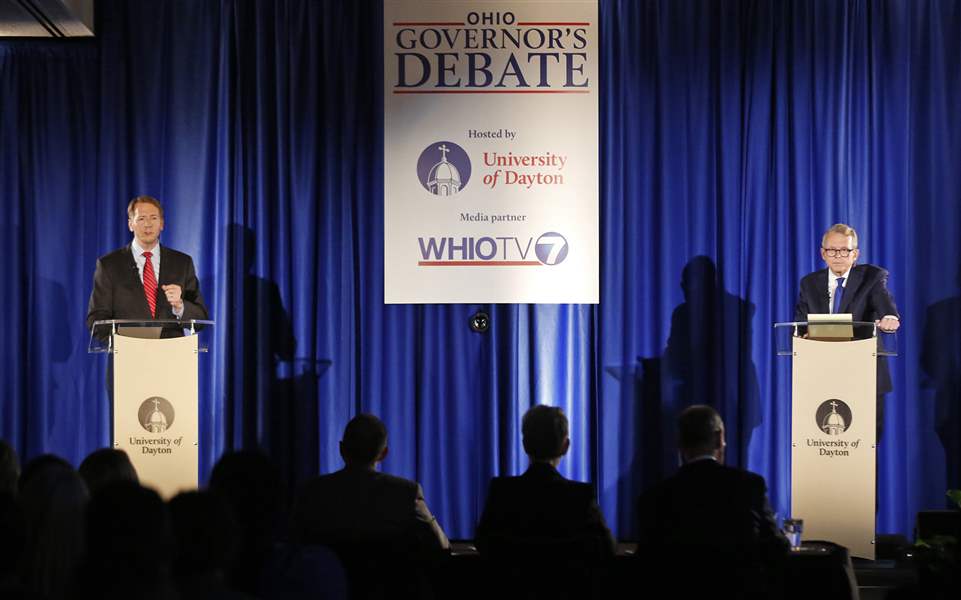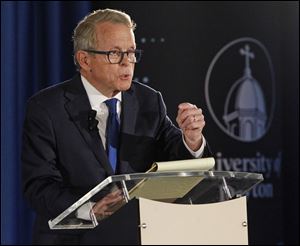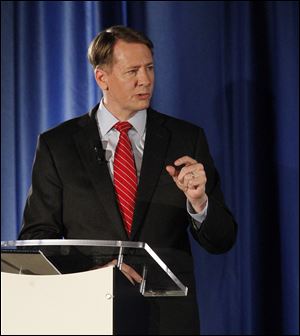
DeWine, Cordray take the gloves off in first gubernatorial debate
9/19/2018
Gubernatorial candidates Richard Cordray, left, and Mike DeWine, speak during a debate at the University of Dayton on Wednesday, Sept. 19, 2018.
ASSOCIATED PRESS
DAYTON — Two major party candidates for Ohio governor not known for their fiery rhetoric on Wednesday aggressively went after each other in their first debate.

Gubernatorial candidate Republican Mike DeWine speaks during a debate with his opponent Democrat Richard Cordray at the University of Dayton.
Democrat Richard Cordray compared Republican Mike DeWine to the “captain of the Titanic” in the battle over the opioid addiction epidemic while Mr. DeWine said the Democrat was living in a “fantasy world.”
They interrupted and spoke over each other during the one-hour debate at the University of Dayton.
Local Republicans, Democrats view debate at watch parties
They fought over who would be tougher on crime, who is better equipped to tackle an opioid crisis that claims the lives of nearly 4,000 Ohioans a year, and who bears the blame for an online charter school's bilking of taxpayers for students it can't prove it taught.
In particular, they went after each other over each's tenure as attorney general — Mr. Cordray for two years immediately preceding Mr. DeWine's current eight-year tenure that began in 2011.
“You have been in charge of this opioid crisis for the last eight years, and the fact that we would listen to you now on drug policy would be like asking for navigation advice from the captain of the Titanic,” Mr. Cordray said as he turned to his opponent.

Gubernatorial candidate Democrat Richard Cordray speaks during a debate with Republican Mike DeWine at the University of Dayton.
Mr. DeWine connected that issue with Mr. Cordray's support of Issue 1 on the Nov. 6 ballot asking voters to amend the constitution to convert low-level, nonviolent drug offenses into misdemeanors that would for the most part not involve jail time.
“He is advocating for the state of Ohio something that is totally outrageous, and that is that somebody could have enough fentanyl to kill 10,000 people, and yet under his proposed constitutional amendment he has embraced and is pushing, that person would receive no jail time. ... If every other state is a felony and every other state takes it seriously that surrounds us ... where do you think the drug dealers are going to come?” he said.
They disagreed on legalization of recreational marijuana. Mr. Cordray would vote for it if it reaches the Ohio ballot. Mr. DeWine would oppose it and would veto any legislation along those lines.
Mr. DeWine would sign the so-called Heartbeat Bill, which would all but outlaw an abortion once a fetal heartbeat is detectable, as early as five weeks of gestation. Mr. Cordray would veto it.
The debate marked the first time voters have seen the two major candidates side by side. It gave them an opportunity to try to define themselves and each other. A poll this week suggests more than 20 percent of voters are still up for grabs in a tight race.
Mr. DeWine bristled at Mr. Cordray's suggestion that he allowed the Electronic Classroom of Tomorrow cheat taxpayers for students who had not logged on long enough to qualify as full-time students.
“This is another example where one of us when we were attorney general did something,” Mr. DeWine said. “The other one did not. ... I'm the only one on this stage that's taken action. ... We have successfully prosecuted this case every single level from local court all the way to the Supreme Court on two separate occasions.”
He said his plan would withhold funding for charter schools until the schools can prove they educated the students.
Mr. Cordray countered that the lawsuit was the equivalent of closing the barn door after the horse had fled.
“They stole $189 million from taxpayers in this state right under your nose, and you did nothing about it,” he said. “Now you've brought a lawsuit to get the money back now that you're running for governor. That's not a protect-Ohio lawsuit. That's a I'm-running-for-governor lawsuit.”
Both candidates have experienced some support from pro-gun rights groups during their political careers, but they went after each other over who had a better plan to thwart school shootings.
“What we're talking about here is reducing gun violence in our society, but you don't really want to talk about guns,” Mr. Cordray said to his opponent.
“You have never been willing to support the legislature at all to make any progress on taking guns out of the hands of criminals, taking guns out of the hands of the mentally ill, taking guns out of the hands of domestic violence abusers. ... Yes, some people think that that should not happen, but it's the right thing to do in this state,” he said.
Countered DeWine: “He has nothing. He has flip-flopped so many times on the Second Amendment that it's just absolutely shocking.”
Mr. DeWine used the question to return to the issue of his clearing a law enforcement backlog of thousands of untested rape kits, something he did frequently during the debate regardless of the question before him, He blamed Mr. Cordray for leaving the problem to him as he came into office in 2011.
“You're smiling. You think that's funny?” Mr. DeWine asked Mr. Cordray. “125 days [backlog], Richard. We cleaned it up.”
Mr. Cordray claims to have laid the groundwork for clearing the delays.
Both candidates said they would preserve Gov. John Kasich's expansion of Medicaid in partnership with the federal Affordable Care Act that Mr. DeWine challenged with other attorneys general in the U.S. Supreme Court.
The Dayton debate was the first of a series of three, none of which will include the Green Party’s Constance Gadell-Newton or Libertarian Travis Irvine. The next will be held on Oct. 1 at Marietta College and the final at Cleveland State University on Oct. 8, two days before early voting begins for the general election
A poll released this week by Cleveland’s Baldwin Wallace University shows Mr. DeWine with a 5 point lead with a month and half left in the race. The attorney general had 42 percent while his predecessor had 37 percent.
Contact Jim Provance at jprovance@theblade.com or 614-221-0496.